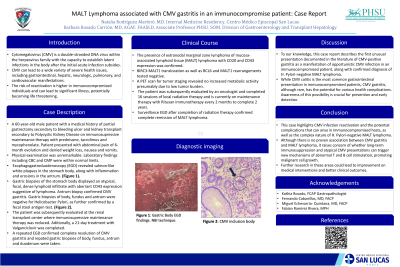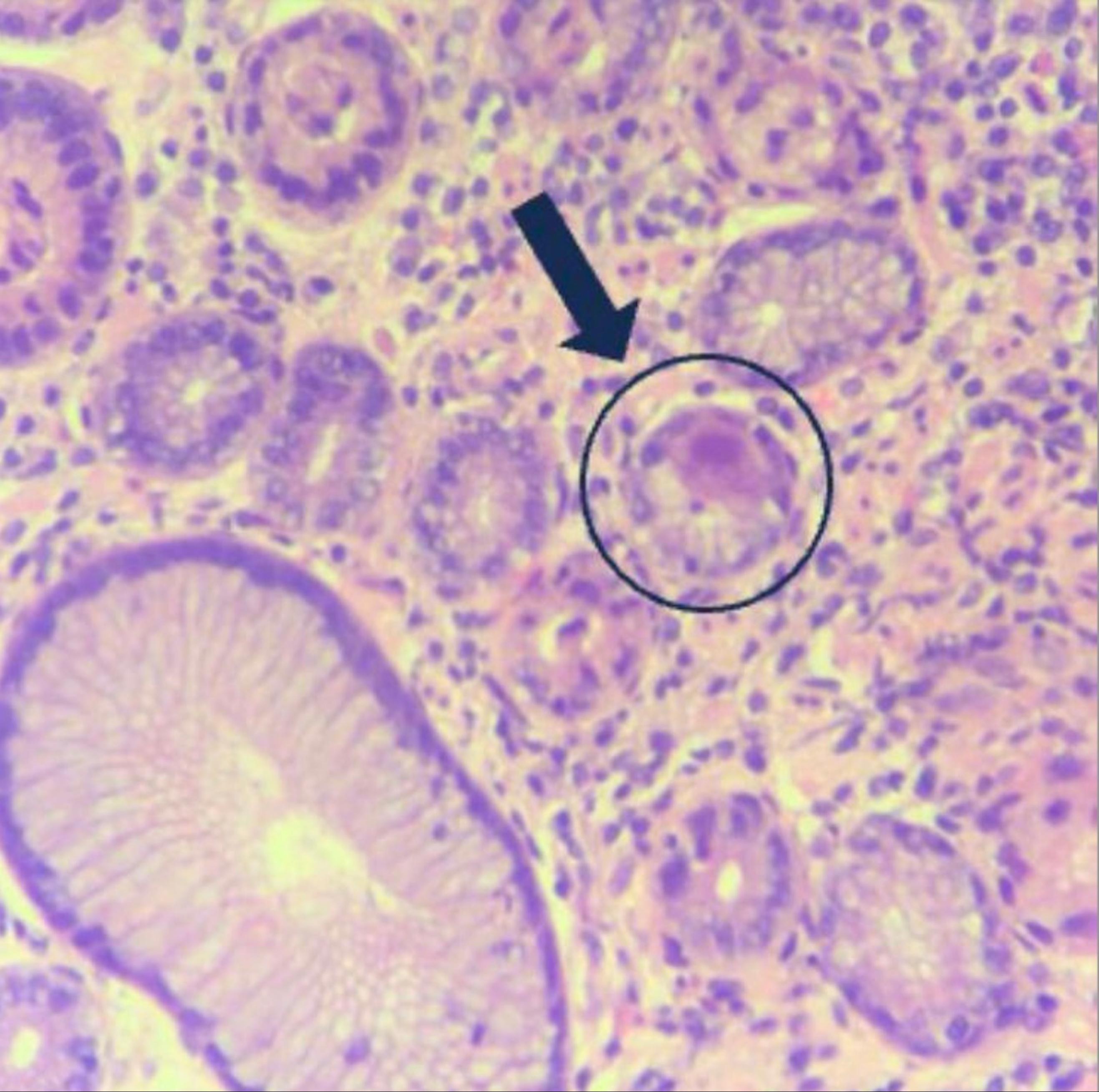Sunday Poster Session
Category: Stomach
P1694 - MALT Lymphoma Associated With CMV Gastritis in an Immunocompromised Patient: Case Report
Sunday, October 27, 2024
3:30 PM - 7:00 PM ET
Location: Exhibit Hall E

Has Audio

Natalia Rodriguez-Martino, MD
Saint Luke's Hospital
San Juan, PR
Presenting Author(s)
Natalia Rodriguez-Martino, MD1, Barbara Rosado-Carrion, MD2
1Saint Luke's Hospital, San Juan, Puerto Rico; 2Ponce Health Sciences University, San Juan, Puerto Rico
Introduction: Cytomegalovirus (CMV) is an enveloped, double-stranded DNA virus within the Herpesvirus family with the capacity to establish latent infections after the initial acute infection subsides. CMV can lead to a wide variety of severe health issues, including gastrointestinal, hepatic, neurologic, pulmonary, and cardiovascular manifestations. The risk of reactivation is higher in individuals with compromised immune systems.
Case Description/Methods: This is the case of a 60-year-old male patient with a medical history of peptic ulcer disease and renal transplant due to a polycystic kidney disease on immunosuppressive maintenance therapy with prednisone, tacrolimus and mycophenolate. Patient presented with abdominal pain of 6-month evolution. Denied weight loss, nausea, and vomiting. Physical examination was unremarkable. Laboratory findings were within normal limits. Esophagogastroduodenoscopy (EGD) was performed and gastric biopsy of the stomach body displayed an atypical, focal, dense lymphoid infiltrate suggestive of lymphoma. Antrum biopsy confirmed CMV gastritis and ruled out Helicobacter pylori infection, as further confirmed by a fecal stool antigen test. Renal transplant center evaluated patient and immunosuppressive maintenance therapy was reduced. Additionally, a 21-day treatment with Valgancyclovir was completed. Endoscopic follow-up confirmed complete resolution of CMV gastritis and the presence of extranodal marginal zone lymphoma of mucosa-associated lymphoid tissue (MALT lymphoma). Patient subsequently completed 16 sessions of local radiation therapy and is currently on maintenance therapy with Rituxan immunotherapy. Surveillance EGD after completion of radiation therapy confirmed complete resolution of MALT.
Discussion: This case highlights the diverse manifestations that can arise from acute CMV infection and the complex nature of MALT lymphoma. It prompts inquiry into whether post-transplant patients may be at higher risk for atypical CMV complications. CMV gastritis, although rare, has the potential for various health complications. Awareness of this possibility is crucial for prevention and early detection. Although there is no proven association between CMV gastritis and MALT lymphoma it raises concern of whether long-term immunosuppression and atypical CMV presentations can trigger new mechanisms of abnormal T and B cell stimulation, promoting malignant cell growth. Further research could lead to improvement on medical interventions and better clinical outcomes.

Disclosures:
Natalia Rodriguez-Martino, MD1, Barbara Rosado-Carrion, MD2. P1694 - MALT Lymphoma Associated With CMV Gastritis in an Immunocompromised Patient: Case Report, ACG 2024 Annual Scientific Meeting Abstracts. Philadelphia, PA: American College of Gastroenterology.
1Saint Luke's Hospital, San Juan, Puerto Rico; 2Ponce Health Sciences University, San Juan, Puerto Rico
Introduction: Cytomegalovirus (CMV) is an enveloped, double-stranded DNA virus within the Herpesvirus family with the capacity to establish latent infections after the initial acute infection subsides. CMV can lead to a wide variety of severe health issues, including gastrointestinal, hepatic, neurologic, pulmonary, and cardiovascular manifestations. The risk of reactivation is higher in individuals with compromised immune systems.
Case Description/Methods: This is the case of a 60-year-old male patient with a medical history of peptic ulcer disease and renal transplant due to a polycystic kidney disease on immunosuppressive maintenance therapy with prednisone, tacrolimus and mycophenolate. Patient presented with abdominal pain of 6-month evolution. Denied weight loss, nausea, and vomiting. Physical examination was unremarkable. Laboratory findings were within normal limits. Esophagogastroduodenoscopy (EGD) was performed and gastric biopsy of the stomach body displayed an atypical, focal, dense lymphoid infiltrate suggestive of lymphoma. Antrum biopsy confirmed CMV gastritis and ruled out Helicobacter pylori infection, as further confirmed by a fecal stool antigen test. Renal transplant center evaluated patient and immunosuppressive maintenance therapy was reduced. Additionally, a 21-day treatment with Valgancyclovir was completed. Endoscopic follow-up confirmed complete resolution of CMV gastritis and the presence of extranodal marginal zone lymphoma of mucosa-associated lymphoid tissue (MALT lymphoma). Patient subsequently completed 16 sessions of local radiation therapy and is currently on maintenance therapy with Rituxan immunotherapy. Surveillance EGD after completion of radiation therapy confirmed complete resolution of MALT.
Discussion: This case highlights the diverse manifestations that can arise from acute CMV infection and the complex nature of MALT lymphoma. It prompts inquiry into whether post-transplant patients may be at higher risk for atypical CMV complications. CMV gastritis, although rare, has the potential for various health complications. Awareness of this possibility is crucial for prevention and early detection. Although there is no proven association between CMV gastritis and MALT lymphoma it raises concern of whether long-term immunosuppression and atypical CMV presentations can trigger new mechanisms of abnormal T and B cell stimulation, promoting malignant cell growth. Further research could lead to improvement on medical interventions and better clinical outcomes.

Figure: Figure 1: Antrum biopsy. CMV inclusion body.
Disclosures:
Natalia Rodriguez-Martino indicated no relevant financial relationships.
Barbara Rosado-Carrion indicated no relevant financial relationships.
Natalia Rodriguez-Martino, MD1, Barbara Rosado-Carrion, MD2. P1694 - MALT Lymphoma Associated With CMV Gastritis in an Immunocompromised Patient: Case Report, ACG 2024 Annual Scientific Meeting Abstracts. Philadelphia, PA: American College of Gastroenterology.
